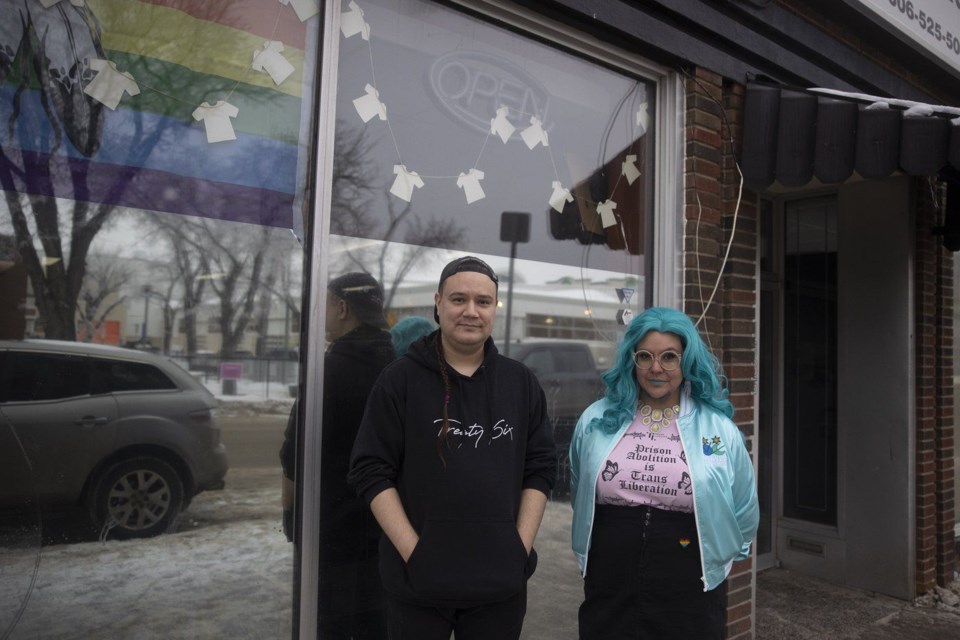SASKATOON - Tiberius Fayant-McLeod is tired of the stereotype that transgender people don’t live in Saskatchewan.
“Trans people are here in Saskatchewan, and we always have been, and we always will be,” said Fayant-McLeod. “And it’s about time we started taking care of our trans communities.”
A new report from a research project Fayant-McLeod managed is shedding new light on trans life in the province.
The 2022 Trans Sask Community Report, titled “So they know we’re here,” surveyed hundreds of two-spirit, transgender, nonbinary and gender non-conforming people in Saskatchewan.
This is the first research project of its kind to take place in the province, and Fayant-McLeod hopes the findings and recommendations can help make Saskatchewan a better place for trans people to live and thrive.
In particular, the research shows that many trans people want to live in Saskatchewan — and do live here — despite some steep barriers.
Fayant-McLeod, who moved back to the province in 2021, was “pleasantly surprised” to see that part of their own experience reflected in the research.
“This is where a lot of us grew up,” they said. “This is where our friends are. This is where our families are. This is my Indigenous land that I am tied to. Many of us want to live here.
“We just need Saskatchewan to catch up, a little bit, with some of the resources that could be really helpful for us.”
Another key finding from the report was that many trans people have a long delay between knowing their true gender, and coming out. Close to half of participants said they came out years — or decades — after realizing their gender, if they came out publicly at all.
“This … delay is often the time during which (two-spirit, transgender, nonbinary and gender-nonconforming) people are most invisible, isolated, and most in need of support,” the report found. “It also speaks to the social and political climate that limits 2STNBGN people from living and expressing themselves openly.”
Respondents also talked about their struggle to get trans-competent medical care.
“Various levels of healthcare continue to exclude and limit access to gender-affirming care with unfair and outdated medical standards, extensive waitlists, prohibitive costs, lists of ‘approved’ doctors, providers’ unwillingness to collaborate with patients, hostile medical environments, and policies and procedures that aren’t transparent or accessible,” the report found.
Fayant-McLeod said access to health care is particularly challenging for trans people living in rural or remote communities.
“The majority of people end up having to come into either Saskatoon or Regina to even get their basic health care,” they said. “And that is a problem for all rural people — not just trans people — but there is an extra burden put on trans and gender-diverse people.
“The waitlists for people coming from rural areas into the cities are just astronomical.”
But, they said, this research and Trans Sask’s other health-care advocacy work also show some hopeful signs for the future.
They think, as doctors learn more about treating trans patients, health-care access will improve.
For example, Fayant-McLeod said, a doctor may not have realized that if they are able to prescribe hormones to their cisgender patients — for example, prescribing estrogen to a woman entering menopause — they can do the same for transgender patients.
“Hopefully, with more practitioners realizing that they are perfectly capable of administering this care, we’ll be able to decrease those waitlists,” said Fayant-McLeod.
For research team member Rachel Loewen Walker, the findings about the importance of queer, trans, two-spirit and nonbinary service organizations stood out.
Many respondents described these local organizations’ services as “life-saving.”
“The organizations that do exist — and there aren’t many in Saskatchewan — are making a big difference in people’s lives,” she said.
Even though the research was conducted in 2021, when many in-person groups and events had been canceled due to the COVID-19 pandemic, respondents said they were able to go online to find the help and support they needed from Saskatchewan-based organizations.
Trans people living in rural Saskatchewan also shared their unique experiences as part of this research project. They spoke about the particular challenges, and unique joys, that come from being transgender outside of the urban centres.
“The research demonstrated how living in a rural setting made some things just that more difficult,” said Loewen Walker.
“When there are already fewer services, or those services are only available in Saskatoon and Regina, it makes it more difficult. But there were great stories of people coming back to Saskatchewan after moving away. People who lived in rural settings shared how they were committed to creating a better future, making it more positive and supportive for the next generation.”
The report ends with dozens of recommendations for how to make Saskatchewan a better place for trans people to live — from health-care providers to educators, organizations, researchers and government officials.
“Saskatchewan has a reputation for being very slow to implement changes,” Fayant-McLeod said. “That was demonstrated by us waiting until 2014 to add gender identity to the Saskatchewan Human Rights Code. But, while we are definitely slow to change, I also feel like it’s sometimes really hard to know where to start, especially for people who might have never thought about the trans people in their lives and in their communities.
“So I wanted to put these recommendations — these starting points — here.”
Now that the report is out in the world, Loewen Walker said these results have left her feeling optimistic — about the richness of trans life in Saskatchewan today, and about how much better things could get in the years ahead.
“Trans people are incredible and joyful and have the potential for such bright futures, with shifts to some of these systemic barriers,” she said.




